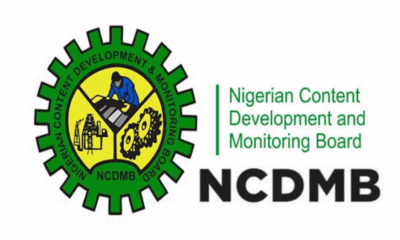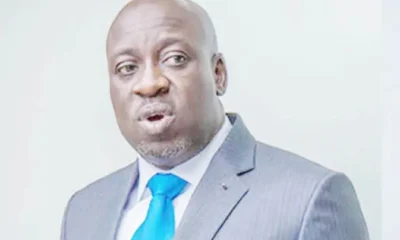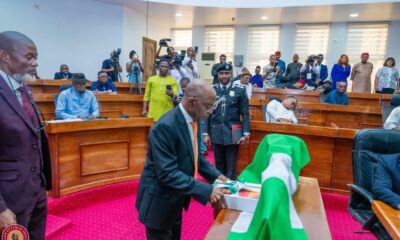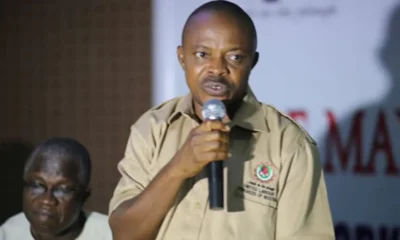News
Bridges, Roads Succumb To Flood In Taraba, Kebbi, Others
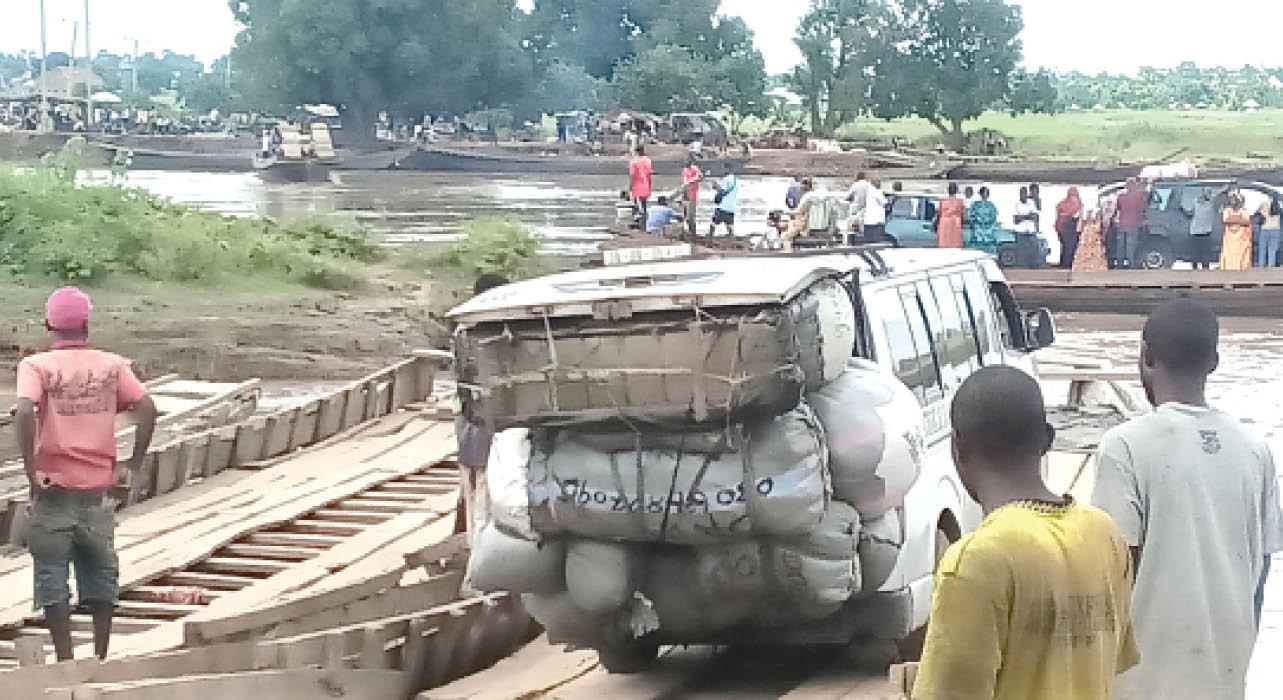
Bridges and roads are critical infrastructure that make the movement of people and goods from one location to another easy. However, in recent months, communities across many parts of the country have been grappling with the devastating impact of floods that have washed away bridges and cut off vital road networks. In this report, Weekend Trust looks at how the destruction of bridges and roads are taking tolls on the people.
Commuters in communities cut off from others by multiple incidents of bridge collapse have been crying over the situation they found themselves. Our correspondents who visited some of the collapsed bridges and damaged roads found that most of them had lasted for years without proper attention.
Plateau’s Kufai bridge
In Plateau State, Kufai bridge, located near Yelwa community in Shendam Local Government Area, was built over three decades ago, serving as a crucial link for motorists and pedestrians in the southern part of the state.
A significant volume of water passes under the bridge, especially during the rainy season, making its structural integrity, which is crucial for the safety of users, shaky.
Commuters within and outside the state frequently use the bridge for social and economic purposes.
People moving from Plateau to either Nasarawa or Taraba states rely on the bridge, as well as truck drivers carrying food items to the North-East and North-West.
Unfortunately, with the collapse of the bridge, it has become extremely challenging for road users to cross the river, particularly during the rainy season when the water volume is high.
Those familiar with the route often wait for the water level to subside before attempting to maneuver through the river, posing significant risk to their safety and livelihood.
This precarious situation underscores the urgent need for the reconstruction of the bridge to restore connectivity and ensure a continued flow of goods and services across the region.
Our correspondent reports that the bridge collapsed in 2022 but remained in a state of disrepair until this year when a partial repair was undertaken in a bid to restore its functionality.
But residents and commuters claim that barely two weeks after the repair, the bridge collapsed again in August during a heavy rainfall that washed away the makeshift work, causing significant difficulties for road users, who now face treacherous conditions and increased travel times.
Motorists lament that more often than not, when they reach the bridge, they pay labourers to push their vehicles to the other side of the road before continuing their journey.
A resident of the community, Wayu Bamga said, “The collapse of the bridge has been causing hardship. We have been struggling. The government should please come to our aid because the situation here is very difficult without the bridge. The bridge initially collapsed last year and a partial repair was done, but it didn’t work. That is why it collapsed again.”
Another resident of the community, Nanlong Nyas said, “I remember that last week, the bridge was repaired, but after the recent rainfall, it collapsed again. We have been suffering to cross the river with goods.”
A regular user of the bridge, Celina Nankup, also pleaded for urgent repairs by the government.
A driver who plies the route regularly, Umar Sa’adu complained that, “The collapse of the bridge is causing a lot of hardship for people like us that use it on a daily basis. People passing from Shendam to Garkuwa are not finding it easy at all. It is very challenging.”
Abubakar Haruna, another driver complained: “This bridge collapsed since 2022. I ply the road, but anytime I get to this point, it is never an easy thing for us, forcing other people to seek an alternative.”
Namnai bridge in Taraba
One year after the collapse of Namne bridge, along Jalingo-Wukari, a Trunk A road in Taraba, the state and federal government have not done anything to address the suffering of thousands of travellers plying the road.
It was learnt that promises by the federal government, Governor Agbu Kefas, whose hometown, Wukari, is located along the road, and the North-East Development Commission to reconstruct the bridge have not been fulfilled.
The bridge, which collapsed after a heavy rainfall in August 2024, links states in the North-East to South-East, South-West, as well as the Federal Capital Territory, Benue, Plateau and Nasarawa states.
There is a diversion of goods and services on trucks and luxurious buses, which had thrived for over 43 years, to Garba-Chede town.
However, only small vehicles, such as motorcycles and people pass through the river near the collapsed bridge on engine boats and canoes on charges by ferry operators. It is said that in the past, over 1,000 people plied the route in a day.
Findings by Weekend Trust revealed that the cost of transportation and prices of essential items have gone up as result of the distance drivers cover before reaching their destinations.
Vehicle owners and commuters now face additional delay in their journey, as well as the danger involved in crossing the river on ferries as many people are unfamiliar with the movement inside a ferry.
A commercial vehicle driver, Adamu Hamman, recalled an ugly incident where a pregnant woman and a three-year-old child were on the engine boat ferrying them across and it capsized.
Findings further revealed that not long ago, more than 50 vehicles fell from boats into the river, resulting in the destruction and loss of passengers’ properties in the water.
Another driver, Adamu Jafaru, complained that boat operators were exploiting vehicle owners by charging them high fees to cross their vehicles – from N4,000 during the dry season to N6,000 when the water level rises.
Muhammed Umar, another driver, said he plied the road three to four times every day, and on each crossing, he would pay N3,000. He called on the federal government to rebuild the bridge to ease the movement of goods and services.
A trader from the eastern part of the country, Felix James, said it’s unfair for the federal government not to fix the bridge for traders who transport goods to Taraba, Gombe and Bauchi states.
James advised stakeholders in Taraba State, including the governor, minister and members of the National Assembly, to mount pressure and lobby, as well as send a high-powered committee to see the president over the bridge so that immediate and permanent solution would be provided.
The senator representing Taraba Central, Alhaji Haruna Manu, said there were ongoing efforts to ensure that work on the bridge begins.
Manu said that apart from raising the matter on the floor of the Senate under Matters of Urgent Importance, he visited the Federal Road Maintenance Agency (FERMA) last year and discussed the need for a speedy reconstruction of the bridge.
The senator further said that stakeholders from the state were concerned about the bridge, and called on President Bola Ahmed Tinubu to listen to the cry of the people of Taraba by approving the immediate construction of the bridge, just like Larmurde bridge in Adamawa State.
Also, the member representing Bali/Gassol federal constituency, Ja’faru Yakubu Chiroma, said he had equally raised the issue of Namnai bridge on the floor of the House of Representatives under Matters of Urgent Importance and begged the federal government to urgently construct the bridge.
The lawmaker disclosed that immediately after the bridge collapsed on August 23, last year, he mobilised two ferries to the site to assist motorists in crossing the river without cost.
Investigation by Weekend Trust also revealed that three more bridges in the state are on the verge of collapse, namely, Pampatel bridge, along the Jalingo-Wukari road, which is located about 12 kilometres away from Namnai bridge; Pamanga bridge and Mayo Kam bridge, along the Jalingo-Bali road. Erosion has destroyed a section of the two bridges.
Zango-Gwallaga bridge, Bauchi
Commercial activities have been paralysed at the Zango-Gwallaga Mayaki community at the outskirts of Bauchi metropolis following the collapse of the bridge during a heavy downpour last month.
Findings indicate that no life was lost during the incident, but the aftermath has continued to unleash lots of difficulties, with reports of some of the affected residents selling their houses to relocate to another place within the metropolis.
A resident, Muhammad Idris, told Weekend Trust that the collapsed bridge has weakened small and medium enterprises and plunged residents into untold hardship, noting that gully erosion is adding to the bad situation.
Idris added, “The most disturbing thing now is that you cannot move any heavy thing or large commodities from or out of Gwallaga Mayaki due to the bridge collapse. Commercial activities have been put on a standstill. Commercial tricycles and motorcycles have stopped patronising the community since the collapse of the bridge, which moves in and out of the community.”
Another resident of Gwallaga Mayaki, Abubakar Sadiq, popularly known as Mai Adoran Tashi, said the collapse of the bridge had created a very difficult situation for the people.
“Although the state government is constructing a new road in a different direction linking Gwallaga Mayaki with Zango, even
before the unfortunate incident, floodwater has consumed and destroyed many houses, especially in the western part of the collapsed bridge,” he said.
Sadiq pleaded with the Bauchi State Government to urgently intervene and tackle the ravaging gully erosion that is expanding and destroying houses and farmlands so as to rescue the people of Gwallaga Mayaki.
Another resident, Mohammed Sani, said the collapsed bridge had paralysed business activities and affected other social services, as well as children going to school, traders and farmers residing along the old road. The new road under construction is a long-distance for the people of the area
The Commissioner for Works and Transport in Bauchi State, Professor Titus Soul Ketkuka, had during a media scorecard programme organised by the Ministry of Information and Communication, Ministry of Budget and Multilateral Coordination, in collaboration with media organizations, on a radio programme monitored by our correspondent, said the ministry was aware of the collapsed Zango-Gwallaga Mayaki bridge and had sent engineers to assess the damage.
Sokoto’s Gwalli bridge
In what has become a recurring tragedy across northern Nigeria, the lives of ordinary citizens are being lost almost on a daily basis, not just to banditry but years of neglect, failed infrastructure and government’s inaction.
On Saturday, communities in Gwalli in Gummi Local Government Area of Zamfara State, were plunged into mourning after a locally made bridge collapsed under the weight of an overloaded commercial bus, killing 19 people. Survivors and eyewitnesses recounted the harrowing scenes as the vehicle carrying 40 passengers to a wedding plunged into a river.
The passengers, mostly from Zuru and Jega in Kebbi State and Fass in Zamfara, were heading to Sakaba village for the wedding ceremony of Hafsa Kabiru when the tragedy struck. The Toyota Hummer bus, built to carry 18 passengers, was packed with more than twice its capacity.
Eyewitnesses described the wooden bridge constructed by residents after the original one collapsed years ago as a “known death trap,” particularly during the rainy season. The overloaded vehicle became stuck on the bridge, prompting the driver to offload some of the female passengers, including the bride. Moments later, the bus lost balance and tumbled into the river.
“Seventeen corpses were pulled out on Saturday, one was found Sunday and one is still missing,” Liman Bello Muhammad Gwalli, a resident said.
One of the lucky survivors identified as Rabi said she was alive because a friend persuaded her to get off the bus and wait for a second trip. “We watched it sink. One woman was found lifeless, still clutching her dead child.”
Another survivor, Habiba Musa recalled, “My friend, Safiya and I got off against our will, not knowing that the decision would save us. I lost two close friends that day.”
The police later confirmed overloading as the primary cause of the accident.
The representative of the area in the state House of Assembly, Adamu Gumi, expressed frustration, saying he had raised motions in the House and appealed to the Zamfara State governor to fix the bridge.
Gumi said, “It was even budgeted for but nothing was done. Residents were forced to create dangerous makeshift paths. This accident was waiting to happen. Now, 19 people are gone.”
Residents of Sabon Birni and neighbouring Shinkafi in Zamfara State now face a different kind of crisis – a combination of floods and fear – forcing them to pay armed escorts to travel safely to the state capital.
The Sokoto State deputy governor, Idris Gobir, confirmed government’s intention to construct a new access road after visiting the collapsed areas.
Governor Ahmed Aliyu has also distributed 20 motorised boats and 2,000 lifejackets to boost safety in riverine communities.
Speaking at the distribution ceremony in Dundaye village of Wamakko Local Government Area, Governor Aliyu said the initiative was aimed at safeguarding the lives and property of riverine dwellers who depend largely on water transportation for their daily activities.
“We were touched by the recent cases of boat mishaps recorded in some local government areas, which claimed lives and destroyed property. I want to use this medium to warn captains of these boats to desist from overloading. Anyone found doing so will be dealt with accordingly,” the governor cautioned.
Also speaking, the special adviser to the governor on the State Emergency Management Agency (SEMA), Aminu Liman Bodinga, commended him for his sustained support to the agency, especially during emergencies.
According to him, the government, through the National Emergency Management Agency (NEMA), had expended over N3 billion on the purchase of food and relief items distributed to displaced persons across the state.
The managing director of the National Inland Waterways Authority (NIWA), Alhaji Munirudeen Bola Oyebamiji, represented by Muhammad Bello, an engineer, praised Governor Aliyu for the gesture, which he said would go a long way in protecting the lives of rural dwellers.
He disclosed that Sokoto was the second state after Lagos to make such procurement, and further commended the governor’s support for federal establishments in the state, describing it as worthy of emulation.
Fana bridge, Kebbi
Kebbi State recorded devastating havoc caused by floods in the past few weeks of heavy rainfall. Some of the bridges linking communities in the state were washed away by floods, as well as the ever-busy Birnin Kebbi-Makera road linking the country with the Republic of Niger.
Also, Fana bridge in Dandi Local Government Area of the state was washed away. Because of this, the Kamba-Kyangakwai-Fana-Dakingari international road is now a no-go zone for vehicles.
The bridge had collapsed on three trucks as they were crossing it and they went into the river. The drivers, Womino Kwami, Yahaya Mumini and Siriyakan Afumumuni, said they were Togolese heading to Togo from Niamey, Niger Republic at the time of the mishap in Fana.
Also, travellers on the ever-busy Birnin Kebbi-Jega-Koko-Lagos road had to traverse a long distance through Dakingari due to the collapse of Liba bridge on the highway.
The Commissioner for Works, Abdullahi Umar Faruq Muslim, an engineer, during the assessment of the damage caused by floods in the state, said Kebbi was critical to the food supply chain of the federation.
“When there are no roads and bridges for transportation, the consequences are severe. We are fearful that Kebbi can be cut off from other parts of the country,” he said, adding that this year’s flooding is massive and merciless.
Realising the dangers of Kebbi being severed by floods from the rest of the country, Abba Aliero, younger brother to Senator Adamu Aliero, got the nod of Governor Idris to repair the damaged sections of the bridges to restore vehicular movement on the road.
Because of the havoc caused by floods to many communities in the state, Governor Nasir Idris raised a committee to assess the level of damage caused by floods in Birnin Kebbi, Bunza, Dandi and Suru local government areas of the state. He also paid compensation to owners of farmlands at Kamfani village, where those affected by floods are resettled
The permanent secretary in the Ministry of Lands, Abubakar Muhammad, said 14 hectares of land were acquired for allocation to households to begin the construction of new homes.
“The government has quantified each hectare of land at N1 million. One hundred and eighty-two people were displaced by flooding, but they can now return to normal life because land has been acquired by the government, which is allocated free of charge to them to construct new houses on higher ground. Interim relief items comprising foodstuffs and building materials were also provided to the victims on the approval of Governor Nasir Idris,” he said.
Following the collapse of the bridge, locals in the communities said it caused untold hardship for them as they were practically cut off from the rest of the state.
A paddy rice trader in Fana, Sanusi Fana said: “We could not come out of our community because of the collapse of the bridge. We couldn’t do anything while our businesses suffered. Many of us take our paddy to the Sunday market in Kamba for many weeks. We couldn’t do that; we couldn’t even move out of our community. It was a terrible experience because many people suffered.”
A farmer, Aliyu Sambawa recounted the pain caused by the collapse of the Makers mridge, which he said stopped him and many others from going about their daily farming activities.
The vice chairman of Dandi Local Government, Bala Isah Buma and the district head of Fana, Muhammad Sani Abubakar, expressed appreciation to Governor Idris for donating N50 million and rice consignment to the victims of the disaster as interim relief, while calling on individuals in the state to render their assistance to those affected by floods.
Niger’s Babban Rami bridge
While the state continues to grapple with poor road network, another setback occurred on September 3, 2025 when the Babban Rami bridge in Mashegu Local Government Area collapsed following a heavy rainfall that washed it away.
The bridge was completely destroyed, cutting off passage between Kontagora and Makera.
This road, which serves as a major link between the northern and southern parts of Nigeria, had been in poor condition for years before finally collapsing. It is also the route frequently used by travellers from Zamfara and Sokoto states, heading South.
Speaking with Weekend Trust, Bello Yahaya, the secretary of the Truck Drivers Association, Minna Farm Centre branch, said the deplorable state of roads in Niger State was the major cause of incessant accidents involving heavy-duty vehicles.
One of such places is the Lambata-Lapai-Agaie-Bida road, where construction has been ongoing since the administration of President Muhammadu Buhari.
Residents and heavy-duty vehicle drivers decried the slow pace of the construction and called on the federal government to complete the project to ease their suffering.
Several other roads are also in deplorable conditions, including portions of the Suleja-Minna road, the Birnin Gwari-Bokani-Jebba road, as well as the Minna-Zungeru-Regina-Kontagora road.(Daily trust)
-

 Business18 hours ago
Business18 hours agoOil Industry Contracting: NCDMB Issues NCEC Guidance Notes, Rules Out Transfer of Certificate
-

 News17 hours ago
News17 hours agoKnocks For Tinubu For Attending Wedding Without Visiting Kwara Massacre Victims
-

 Politics18 hours ago
Politics18 hours agoMakinde, Wike camps set for showdown at PDP HQ today
-

 News18 hours ago
News18 hours agoElectoral Act standoff: Senate calls emergency plenary as protests loom
-

 Business17 hours ago
Business17 hours ago‘Should have been sold before rehabilitation’ — Atiku asks NNPC to discontinue proposed refinery deal
-

 News17 hours ago
News17 hours agoInsecurity: ADC Spokesman Taunts Tinubu, Says Nigeria Has No Gov’t
-

 News17 hours ago
News17 hours agoAbia blames typo after allocating N210m for photocopier in 2026 budget
-

 Politics17 hours ago
Politics17 hours agoElectoral Act: NLC Threatens Mass Action Over Senate’s Rejection Of Real-Time Transmission Of Results



